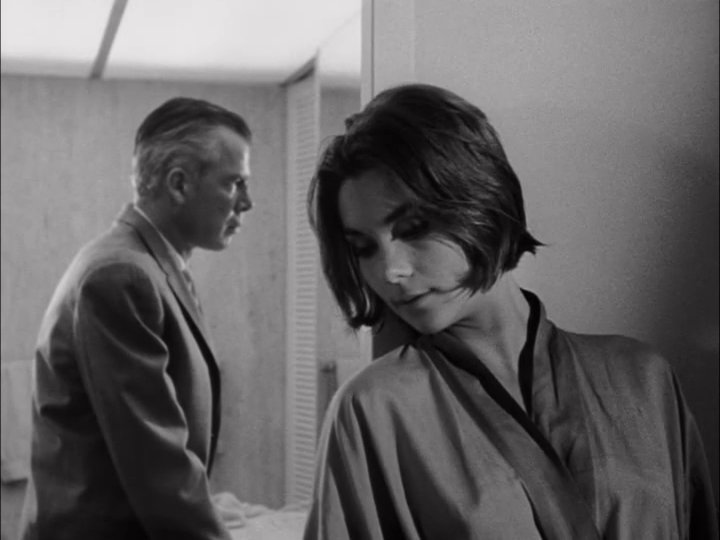
LeeTV:
LEE & SAM
john cribbs
Lee Marvin wasn't created with Cat Ballou: everything he appeared in up to that point played a part in his whiskey-soaked evolution into the bitter, hard badass we all know and love.
John Cribbs got to thinking about how amazing it would be if there were a channel that you could flip to any time of the day and see Marvin in some long-forgotten TV serial. Since nobody's had the inspiration to create such a glorious shrine, he decided to program his own personal Lee Marvin Network by unearthing some examples from the first leg of Lee's filmography and make them part of a series called "LeeTV."
{LeeTV index}
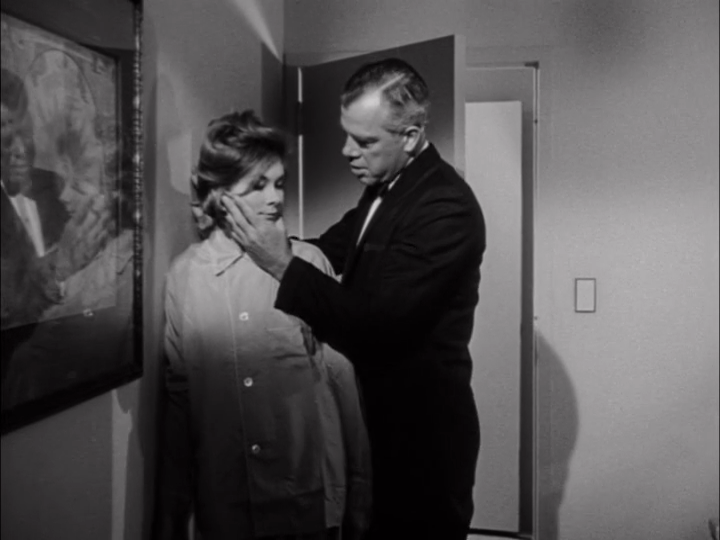
ROUTE 66:
S2 E9: "Mon Petit Chou."
sam peckinpah, 11/24 - 1961.
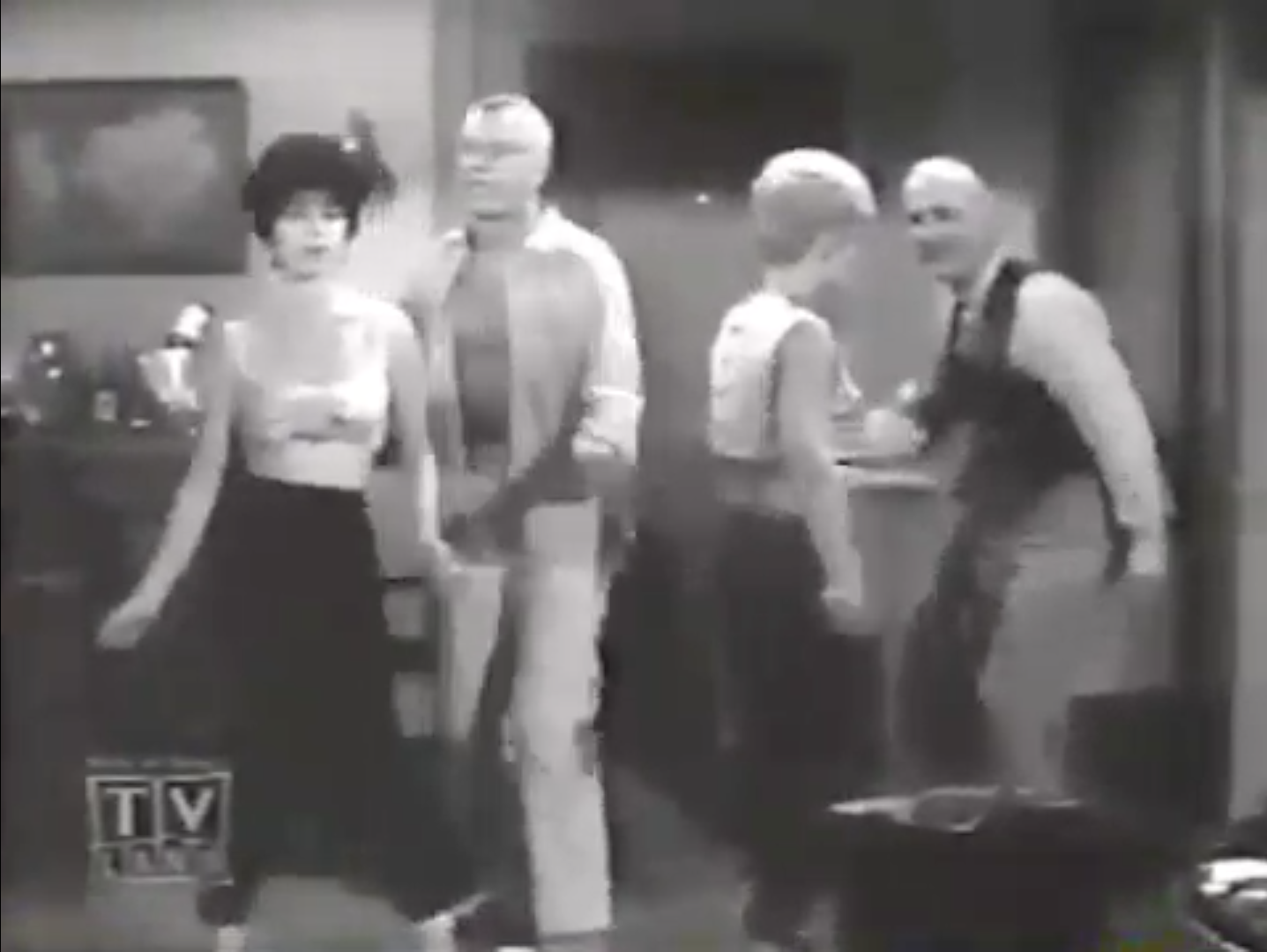
THE DiCK POWELL THEATRE:
S2 E16: "The Losers."
sam peckinpah, 1/15 - 1963.
~by john cribbs~
"The problem with Sam and I was: I had Sam's number and he had mine, and that's a dangerous thing because he’s a little guy."
- Lee Marvin
Lee Marvin and Sam Peckinpah go together like hot whiskey and the dirtiest glass found on the blood-stained floor of the seediest dive in the desert outskirts of Juárez. Considering their notorious reputations and similar career track, it's shocking that they never worked on a feature film together, though it wasn't for lack of trying. Peckinpah had wanted Marvin for the role of one-armed scout Sam Potts in Major Dundee, but Marvin turned it down and James Coburn was cast instead. Marvin was set to play the lead in The Wild Bunch until his agent convinced him it was too similar to his role as Fardan in The Professionals; he ultimately abandoned it for a record payday on Paint Your Wagon (Marvin had, in fact, been pivotal in getting his stuntman friend Roy Sickner's original treatment for The Wild Bunch into Peckinpah's hands). Then in the 70's, Peckinpah spent three years developing the Marvin vehicle Emperor of the North only to have the project ripped away from him by producer Kenneth Hyman.1 Though the giant talents of these two men were destined for the big screen, their merging would have to be boxed into the small one via two episodes of television that aired a little over a year apart in the early 60's: "Mon Petit Chou," a segment of Herbert B. Leonard and Stirling Silliphant's Route 66 and "The Losers" for The Dick Powell Theatre, an anthology series from Four Star Television (the company founded by Powell, Charles Boyer, David Niven and Ida Lupino).
The airing of these programs came at a crucial time for Peckinpah, bookending the release of his breakthrough film, 1962's Ride the High Country. His ascension as a promising and prolific writer/director for television had led to his first feature The Deadly Companions, a terrible experience which saw producer Charles B. Fitzsimons take creative control away from Peckinpah and set the course for a filmography of turbulent misfires and career-reviving reprieves (its shaky trajectory in no small part a result of Peckinpah's own self-destructive tendencies; he was fired from his first job, a stagehand for The Liberace Show in 1952, for refusing to remove his hat while working). The first of many rebounds was High Country, a quiet masterpiece which so floored Charlton Heston he campaigned for Peckinpah to helm Columbia's epic western Major Dundee - leading to a chaotic production that threatened to cut short the young filmmaker's time in Hollywood.
But I'm getting ahead of myself: it's 1961, Peckinpah's still recovering from his unfulfilling experience on Deadly Companions and meets Route 66's roaming second season production in Pittsburgh for a rare non-Western entry on his television resume (following the Civil War-set Companions, Peckinpah probably wanted to shake the sand out of his shoes as it were). The episode sees the Corvette-driving cross country duo of Tod and Buz attempting to save rising-star singer Perette Dijon (Macha Meril)2 from the grip of tyrannical manager Lee Marvin, who'd previously appeared on the Season 1 episode "Sheba." Those who caught "Sheba" earlier that year may have experienced the nagging sensation they'd seen all this before. Here we have another story of a woman whose life is controlled by a dominating prick played by Lee Marvin, the title of the episode his creepy nickname for her. The 'vette boys intervene on her behalf, get their asses handed to them by Marvin, then return in the third act to valiantly sucker punch their enemy and beat him into submission. Having only seen these two episodes, I wouldn't be surprised to learn that every goddamn Route 66 plot had Tod and Buz swooping in to deliver a poor, helpless woman from the claws of Lee Marvin. Either that, or the casting department had a file labeled "possessive, misogynistic bully" that only had a picture of Lee Marvin inside.
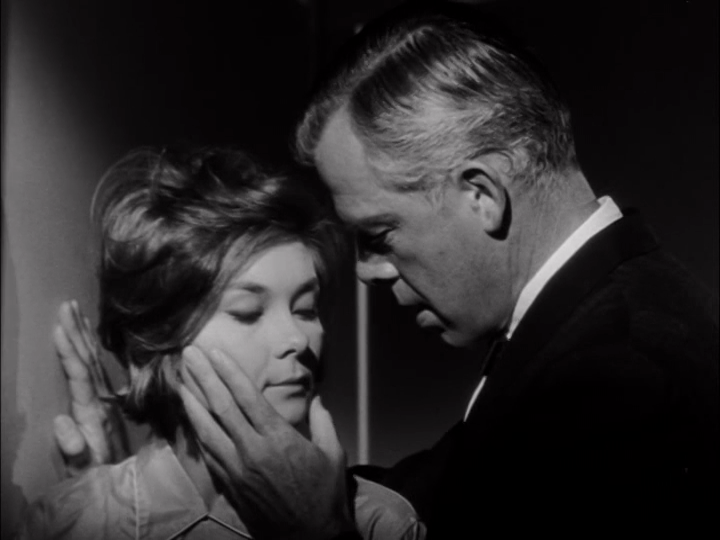
John Ryan (misidentified as "Glenn Ryan" in the opening credits for some reason) is at least a deeply anxious bully, and what sets the story of "Mon Petit Chou" apart from Marvin's previous episode is the effectiveness of his character's oppression. In "Sheba", Marvin's Woody Biggs has full dominance over his lady victim for several reasons: he's a big shot ranch owner, he has pull with the cops and the factory where she works, he understands her weaknesses and preys upon her insecurities, leaving her with the impression that she literally has nowhere to go but to him. He's one evil motherfucker. But compared to the tenacious grip Biggs has on his victim, Ryan's is tenuous and largely theoretical. Whereas Biggs was introduced smirking audaciously outside a prison lying in wait for the woman he framed to be released, we first see Ryan from the top of the Pittsburgh Hilton spying on the woman he struggles to keep under thumb through a set of binoculars. While she's having a ball water skiing on the Ohio River, he appears tense and quietly desperate at the thought that she may somehow glide westward towards Cairo, Illinois and out of his life forever.
Perette is a up-and-coming chanteuse from Marseilles who was discovered by Ryan, a former musician turned manager, and brought to the states for a coast-to-coast tour. But while Ryan basks in life on the road with endless press junkets at hotels, it becomes immediately clear that Perette is burned out and sick of the whole lifestyle, as she confides in stranger Tod her life has become just "another city, another opening night, another song." She's stuck in a "7 year contract with 5 years to go" which is apparently a pretty lousy contract, as Ryan brags that he keeps 100% of what she makes. Not only that, he completely dominates her stage persona, approving wardrobe (for some reason, his artistic signature as a manager is that his singers wear single-strap dresses) and making last minute changes to the set list after reading the crowd at any given venue. This is an interesting relationship to examine, to consider the extent that a female musical artist is "created" by her management, something even more relevant these days with the horrifying truth coming out about, say, Ke$ha and Dr. Luke or Aaliyah and R. Kelly. Predatory managers make for a natural scummy antagonist, especially when infamous real-life examples like Tony Defries and Don Arden were more like gangsters than entertainment managers, complete with henchmen who'd carry out their dirty work for them.
Ryan's got his own henchman in Higgy, played by Robert Altman regular Bert Remsen. Higgy serves as Perette's handler, dragging her back to the hotel after her water ski adventure, but mainly watches over Ryan, tolerating his boss wallowing in self-pity and fawning lecherously over Perette like the world's least patient bartender (indeed, Remsen played a bartender five times in his career, including for Altman in Buffalo Bill and the Indians). Trying to convince Perette that Ryan's just going through a phase, Higgy assures her, "You gotta give him a little more time. Maybe then he'll open his eyes and he'll see what he has. Truth, beauty and all the good things he's got comin' right under his dumb Irish nose." This was also Remsen's second time on the show (he'd appear on two additional episodes the following year) and he reports of his co-star: "[Lee]'d come in all disheveled and go throw up in the corner. Sam would say, 'Wash his face. He's fine.' He'd do the scene and never miss a line."
But for all the evidence that Ryan's ruthless manipulation of Perette is done out of a combination of greed and exploiting her talents to legitimize his own failed artistic career (he even plays accompanying piano with her on stage), there's more to it than that. Poor Higgy has to sit and listen to Ryan drunkenly recall his previous lover and musical partner, who dumped Ryan after hitting it big and shacked up with another fella. Ryan is haunted by the memory of Ann Knowles, the former elevator operator he turned into an international sensation only to have her abandon him (I think he says Knowles, which would be funny - he was spurned by a proto-Beyonce!) "I lose her night after night," he tells Higgy through a haze of cigarette smoke and bitter resentment. He's so convinced Perette will do the same that he can't see himself pushing his "petit chou" away with his possessive ownership of her, his past regrets only becoming transparent in front of her when he dishes out grim advice like, "Sing about love, don't talk about it - that way it won't hurt you."
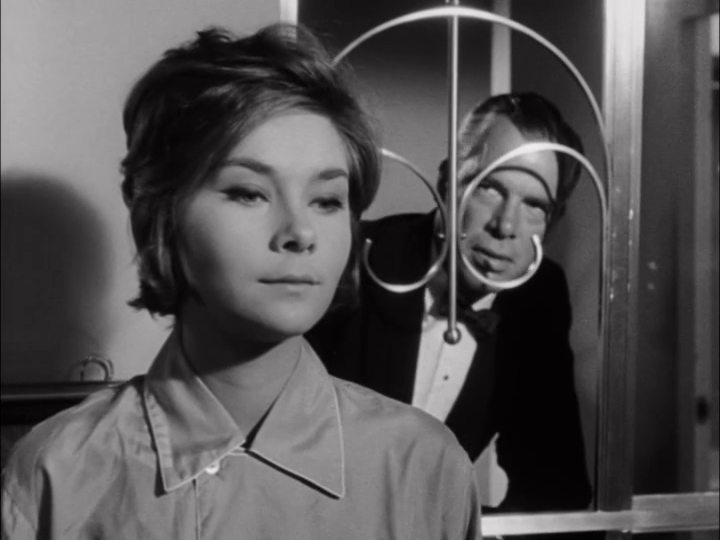
But Ryan sure as shit will, physically abusing Perette any time her desire for freedom comes up in conversation. Peckinpah handles these scenes deftly, framing the two characters with a cage-like window between them as they talk about the idea of her being locked up. ("If I left that door open, you'd run to him so fast.") Marvin is great in these moments, covering his insecurity with swagger and authority, and while Meril clearly has trouble with English her expression is perpetually sad and beautiful. When she calls Ryan "a hungry worm in a wet and rotten world," Meril has the miles of pain and anxiety on her young face to sell it. This is a rare television directing gig where Peckinpah didn't have a hand in writing the script, so he was forced to block scenes full of trademark Silliphant overwriting. At one point Perette asks Ryan, "Would Noah choose us, you and me, if there were another flood? Would he take you as a man and me as a woman, over all the people in the world?" (For the record, no- as we all know, Noah only took his family and castaway Ray Winstone.) Ryan's answer: "I get sea sick." Probably my favorite example from the episode is a bit of hoke beautifully delivered by a weary Lee Marvin: "Who says this is a life? It's an ambush."
Speaking of duos and ambushes, let's not forget the ostensible stars of our show. Buz actually sits out most of the episode (George Maharis was a regular on the long-running soap opera Search for Tomorrow when Route 66 started filming, so he was either splitting time between productions or busy playing chess with Anthony Quinn on the set of the non-M. Night Shayamalan The Happening), but it's funny when Ryan tells Tod "I'd recognize you any place," since Lee Marvin has crossed paths with these punks before. After seeing a front page story about how Tod "saved" Perette from the treacherous waves of the Ohio River (slow news day in Pittsburgh, I guess), Ryan forbids her to see him again, which doesn't stop the young buck from spiriting her away from a party at the hotel. Tod returns with Perette the following morning - they never say exactly what they did in Pittsburgh that night, but it apparently made her "feel free" - and is greeted by Ryan's fist, slugged unconscious right as he's kissing her goodbye. Buz finally catches up to Tod before his buddy can get revenge, straight up asking whether he truly wants to rescue the woman or just regain his hurt pride.
Meanwhile Ryan is drinking and dancing with some floozies, toasting "the flames in our belly and the bones in our throat." He slumps down at the piano and it looks for a minute like we're going to get a Lee Marvin song, but no dice. (Something many people don't know about Marvin is that his rendition of "Wand'rin Star" on the Paint Your Wagon soundtrack was a bonefide #1 hit in the Ireland and the UK in 1970, surpassing "Let It Be" by the Beatles.) Higgy demands the bitches leave, prompting Ryan to roughly kick them out so he can drown himself in a bottle and drunkenly lament how Perette is "all I've got... all I've ever wanted."
Tod catches up with Ryan and Perette at a restaurant where some Pittsburgh Frenchies are having a party in her honor, and has Ryan step outside. He sucker punches Ryan down a flight of stairs (again, from my two episodes worth of experience with this show the main thing I've come to expect from its heroes is that they are always glad to sucker punch somebody from behind; at least Ryan was facing Tod when he hit him in the face earlier). A hellacious brawl between the two is neatly wrapped around a balcony above the hills outside the restaurant so that the diners can look out the window and see the two men attempting to slug one another over the railing. It was during the filming of this fight that Marvin was punched in the nose, requiring 20 stitches3 (it almost cost him his role in The Man Who Shot Liberty Valance, but since the movie was shot in black & white they were able to get away with his recent disfigurement). Tod manages to knock Ryan to the ground and it looks like things are going to end the same as "Sheba," with the bad guy left to scrape himself off the pavement, but Perette appears and asks Tod to back off.
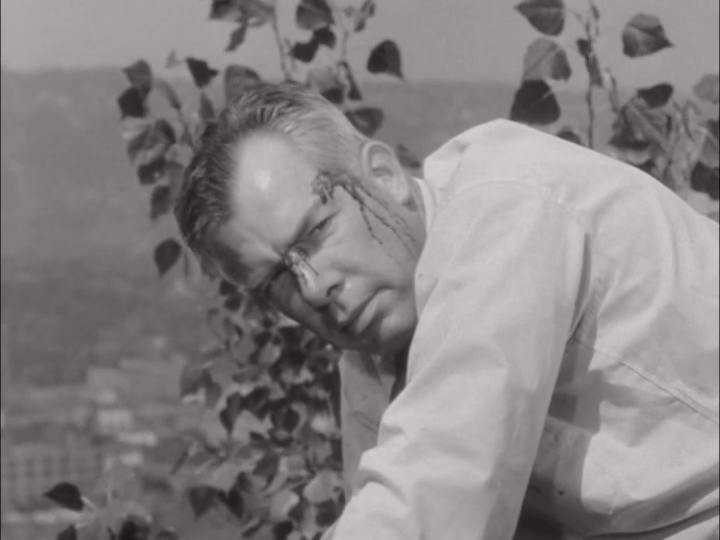
Perette listens patiently as a bloodied Ryan runs through his history with the betraying Ann, which she's apparently hearing for the first time. He then entreats her to run off with Tod: "Go find yourself. Go look where they all look, in the arms of some other guy." However she elects to stay with Ryan! "The hate is out of you. She's out of you. And I can come in." Huh. This is an unexpected outcome. Perette has literally spent the entire episode telling anybody with an ear to listen that this is not the life she wants to live, that the traveling and singing and hosting press events does not make her happy. Now that someone has given her a means to walk away, she rejects it. On the one hand, I want to say it's progressive that she doesn't necessarily need or want to be "saved" by Tod, but she also seems to have come down with a serious case of Stockholm Syndrome. Hasn't this guy locked her away from the world and stolen all her money? Is getting an old love affair off his chest going to suddenly turn him into a good manager? This resolution is interesting, but it raises a lot of questions.
Peckinpah resolved this same sort of scenario much better in "Jeff", the pilot episode of The Westerner, the short-lived show he created and produced which was televised in the latter half of 1960 (in fact, it ran against Route 66). Spun-off from "Trouble at Tres Cruces," an episode of Zane Grey Theater written and directed by Peckinpah the previous year, the series centered around Brian Keith's Dave Blassingame, described by Peckinpah as "a real saddle tramp." The goal of the series, in Peckinpah's words, was to refute TV westerns' portrayals of "never-miss sheriffs, always-right marshals, whitewashed gunfighters who stand behind a tin star of 10 cents' worth of righteous anger and justify their skill and slaughter with a self-conscious grin or a minute's worth of bad philosophy." Peckinpah dove right into his goal of subverting the genre with "Jeff," like "Sheba" and "Mon Petit Chou," its title refers the name of a victimized woman. Jeff (played by Diana Millay, probably best known as the various incarnations of Laura Collins on Dark Shadows) is the childhood sweetheart of Blassingame who's fallen into a life of prostitution and abuse at the hand of saloon owner/pimp Denny Lipp (Geoffrey Toone). A narrow-eyed, hard-bitten Blassingame turns up at the joint, slaps some hombres around (including Warren Oates, appearing in front of Peckinpah's camera for the second time following a supporting role on The Rifleman), outdraws a bartender with an itchy trigger finger and ultimately dukes it out with Denny to get Jeff away from there.
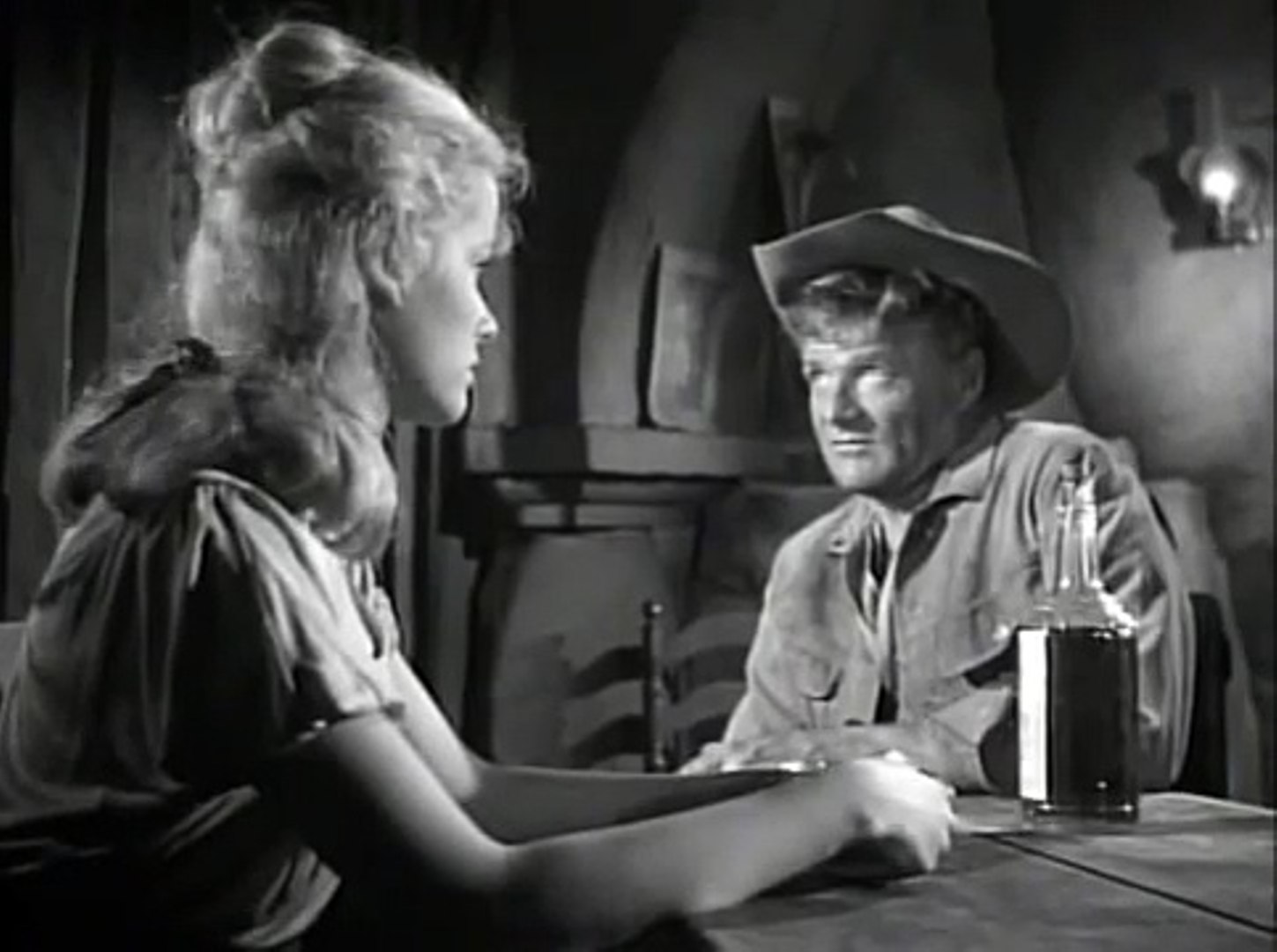
Despite the heroics Jeff ultimately decides to stay, telling Dave, "You want something that isn't here. You want something that maybe never was." It's at this point that you realize Jeff never asked to be saved, that in charging to her rescue and beating the shit out of half the saloon the idealistic Blassingame has come off like a rampaging psycho. While she's clearly not happy, Jeff hasn't complained about her condition a'la Perette throughout the episode and it's obvious she's willing to stick by her own decisions and where they've landed her. At the same time, the end of the story is a tragedy because Jeff has accepted her lot, allowed herself to become horribly debased and misused by Denny and accepted it (he's even predicted that she would, telling her, "You won't leave now because I won't let you. And when I do, you won't want to go.") But in the end Blassingame's no better than Denny, having assumed settling down with him on a ranch would magically make everything ok for Jeff, but what gives him that idea? And what gives him the right to make that decision for her? Blassingame ends up riding out of town alone, having failed, according to Peckinpah, because "he's not cut from any heroic mold."
The tone of The Westerner got much lighter after the pilot episode, the shift coinciding with the introduction of a recurring character, Blassingame's old con artist partner/nemesis Burgundy Smith. Created by Peckinpah's frequent writing collaborator and future Mission: Impossible developer Bruce Geller as "an eloquent hustler out to take the West for what he could get in a charming, roguish sort of way", Smith (played by John Dehner) made his debut in the show's third episode "Brown," returned in its sixth episode "The Courting of Libby" and was on hand for the series finale "The Painting," all directed by Peckinpah. "Libby" is the best of the three, showcasing the comic rivalry between the two shady drifter-grifters who are so alike they can't help despise each other. Finding himself smitten with the lovely Libby (Joan O'Brien, a professional singer who'd made her TV acting debut on the Marvin-starring series M Squad), Keith's Blassingame is flustered when John Dehner's Smith, presenting himself as a successful 'avocado baron', swoops in woo her himself. The tug-of-war for the lady's affections largely seems to exist for its own sake, with Burgundy courting Libby mainly because it's a chance to be competitive with Dave. When it looks like Blassingame's won and will be getting hitched to Libby, Smith pleads with him not to throw away his life of debauchery: "No more the joy of thrusting yourself into the maw of chance. She'll have you tied, boy, apron string and plow. She'll make you quit everything you enjoy - even other women!" The match ends in a draw when an exasperated Libby marries the town's rich stud instead.
Three years after the cancellation of The Westerner, Peckinpah reteamed with Geller to resurrect the duo of Blassingame & Smith for his second episode of The Dick Powell Theatre, "The Losers." Reimagined as a pair of hustlers in the what seems to be the late 20's (however, a few signifiers make the setting unclear - it's possibly even meant to be the late 30's), the self-professed pair of underdogs, "victims of life's whims and caprices," are played by Lee Marvin (as Blassingame) and Keenan Wynn (as Smith). The only returning cast member from The Westerner is Spike, playing Dave's dog Brown as he did in all 13 episodes of The Westerner (Spike was most famous for his eponymous role in Old Yeller). "Losers" sees Blassingame, more a full-fledged crook than his Westerner counterpart, come in to town looking for a lamb to fleece, wisely avoiding the gaming tables but unable to avoid following a couple of cuties to a hotel room hosting a high-stakes tournament of five card draw between a group of intimidating horse traders and his old pal Burgundy Smith. Following some animosity in which Blassingame demands Smith pay back money he owes him in chips, Dave sits back and watches Burgundy win on a hand with 30 miles of railroad, aided by some luminous ink affixed to the back of the cards and a pair of infrared sunglasses.
The two men commence to celebrate with the lovely ladies (yet another boozy Lee Marvin hotel party with two guys and two bored-looking gals) but slowly realize the horse trader's ringleader (reliable character actor bully Mike Mazurki) has purloined one of the cards from the deck for closer examination; their hostesses have been tasked with keeping them there until the gang returns! An epic getaway ensues in which they evade the cheated crew by making it rain in the lobby and tearing away in Dave's truck. A proto-Peckinpah moment occurs when they shove a cleaning cart in front of Mazurki & co., who fly to the floor in elegant slow motion. Pausing to flaunt their less-than-tactful escape, their bad luck sends Dave's truck rolling down a hill and into a ditch just as their pursuers catch up in their convertible. Forced to flee into the woods, they're lucky to come upon a blind traveling gospel singer named Johnny and his young ward, who hide them until the coast is clear and offer to let the men join them until they find their footing.
This opening half of "The Losers" captures the fun spirit of "The Courting of Libby" while the lively comedic action set-pieces make similar scenes from The Ballad of Cable Hogue seem less of an oddity among Peckinpah's other work. The slow motion shot is effective, as are a series of still photos used to montage the card game (not sure whether it was a staple of the series or an innovation of Peckinpah's, but it works). The main show is Marvin and Wynn. As good a team as Keith and Dehner made on The Westerner, these two are phenomenal together, demonstrating an amusing and natural chemistry in all their scenes. Marvin and Wynn - who'd previously done Shack Out on 101 and met up again later in Point Blank - were good buddies off-screen, Malibu neighbors who'd go off motorcycle riding together, and it reads on screen.4 Similar to the mutual hate/respect relationship between Steve Judd/Gil Westrum in Ride the High Country and Amos Dundee/Benjamin Tyreen in Major Dundee, they seem just as likely to hug as knock each other's heads off from one moment to another. Only for them their differences are not morality-based. Sitting up together by Blind Johnny's caravan at night, Wynn's Smith wonders aloud whether they should consider stealing it, prompting Marvin's Blassingame to reprimand him a "blackhearted, money-hungry, chicken-gutted, egg-sucking dog!", adding "Burgundy, you are SCUM" before disclosing that he'd already checked out the rig and it wouldn't be worth the effort anyway.
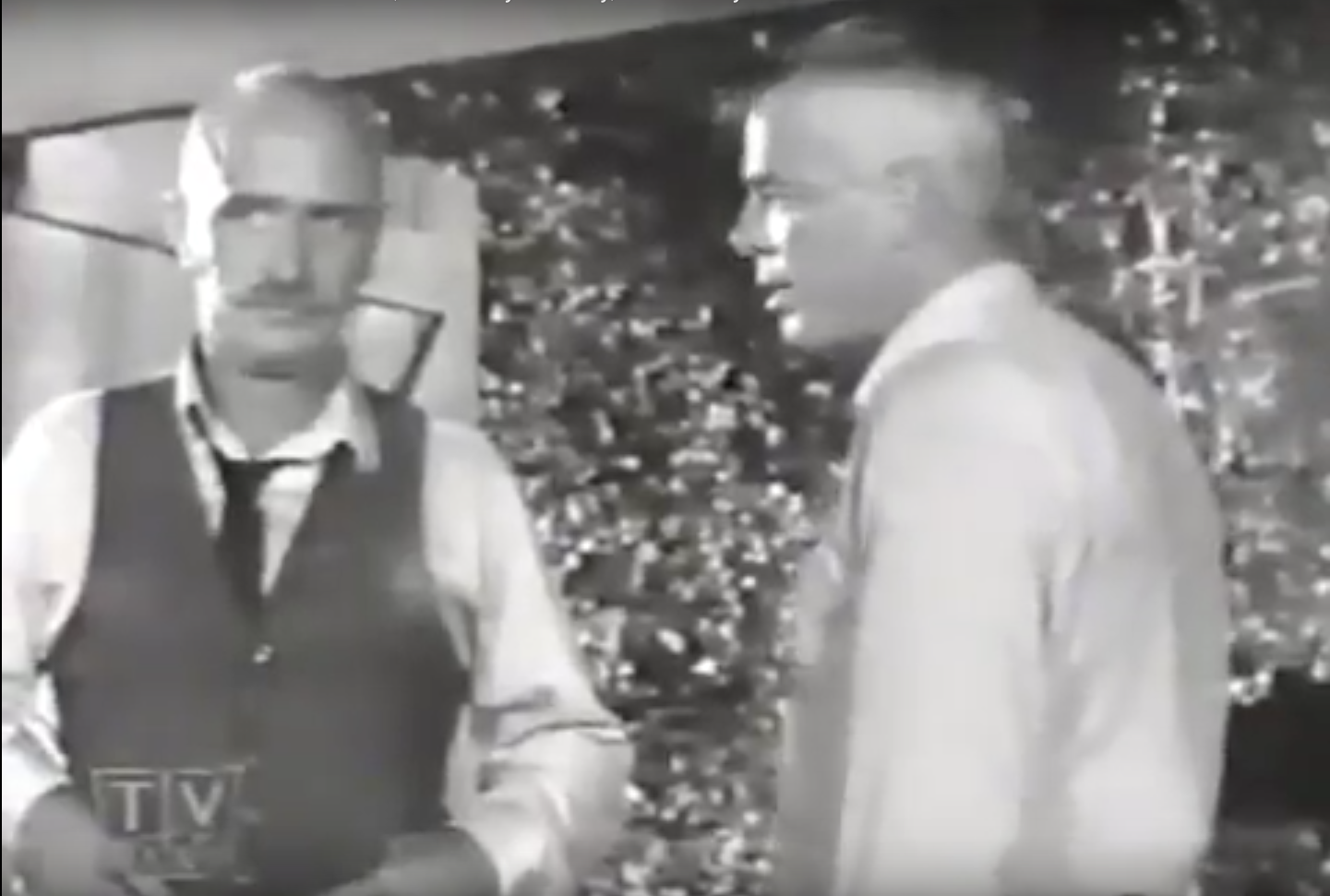
The second half of the episode sort of bizarrely sees our guys stumbling upon a subplot from Ride the High Country. They travel with the singer and the orphaned young man to a farm run by surly Isaiah (Russ Brown), who introduces them to his "ugly" daughter Melissa, played by Rosemary Clooney. A devout crank, Isaiah rails against everything from gasoline to television (“People sendin' pictures through the air - gaaaah!”) but agrees to let the four transients work the place in exchange for food and shelter, making a side deal with Dave and Burgundy to give them an old truck left to rot in the barn if they can repair it. The arrangement is equitable, but takes an interesting turn when Johnny busts out a guitar and makes with the hymns, encouraging Melissa to sing along. Well it turns out she’s got a voice like Rosemary Clooney, but Isaiah sees what's going on and forbids her from harmonizing with the pretty boy preacher. By holding his daughter hostage and objecting to her running off with the two old friends and handsome young dude who've shown up at his door, Isaiah resembles R.G. Armstrong's Joshua Knudsen played to comic effect. Possibly recognizing that he's found himself on the right side of the "bully domineering a woman" scenario from the Route 66 episodes, Marvin enlists Wynn to do something about it.
Their solution? They friggin’ waterboard the guy! Seriously! Blassingame and Smith put Isaiah on a board and hold him underwater until he gives Melissa permission to go sing with Johnny at church! (Now I've got to wonder: was it Marvin or Peckinpah who knew about waterboarding some 15 years before everybody else in America did?) The method is successful, the songbirds are reunited and Marvin gets the last nice moment when Blassingame not only doesn't steal from the church collection plate, he actually contributes to it! Then the convertible of horse ranchers shows up again and our hard-luck losers hit the road in their newly repaired truck to whatever fortune awaits them.
This half of the episode is much clunkier and sappier than the first, with even the humor falling flat. The points Peckinpah scored with the hotel getaway are kind of devalued when he uses the same still images editing for an impromptu raccoon chase that ends with Dave falling from a tree and Smith accidentally clubbing Isaiah over the head. But Marvin and Wynn never lose their charming repartee, particularly on display when Dave and Burgundy take Melissa for a walk in the country, arms linked with her in the middle, courting her back and forth so that they finish each other's lines of poetic verse, assuring her that "Either one of us'd take you anywhere -" "- guaranteeing the other one to be in a jealous, but most polite rage." You'd be hard pressed to find this kind of sweet synchronicity and unabashed bromance down the line in Marvin's partnerships with Eastwood, Mifune, Newman, Keith Carradine and Chuck Norris (closest he'd come to it would probably be his friendship with Jack Palance in Monte Walsh). It makes the whole episode go by like a pleasant breeze (Peckinpah also described filming the episode with the actors as "a joy.")
Airing January 15, 1963, "The Losers" proved so popular it was rerun five times that year and Four Star considered turning into a series with Peckinpah as producer. Sadly, Dick Powell had fallen unexpectedly ill and died of cancer at 59 the same month the episode dropped (Peckinpah was destined to die at the same age). His successor Tom MacDermott didn't do a very good job: Four Star had 13 shows in prime time slots on major networks when Powell died, within two years they'd only have one (Peckinpah also claimed MacDermott wouldn't pay Marvin's price to star in the proposed series, and that when he finally made an offer Marvin told him to shove it). It's too bad the show never came to fruition, but it was time for both men to move on. Peckinpah needed to run the gauntlet of Major Dundee on his bloody path to The Wild Bunch, while Marvin was bound for Oscar gold and leading man status in three short years.
"The Losers" was Peckinpah's last TV job before heading down to Mexico. He'd return from the disastrous Dundee experience only to lose a job directing The Cincinnati Kid; he'd find his redemption back on television with the outstanding 1966 ABC Stage 67 presentation Noon Wine, one of the director's best and most overlooked works (it stands alongside "Jeff" as the best thing he did for TV). Interestingly, the last thing Peckinpah or Marvin would do for TV was Bob Hope Presents The Chrysler Theatre, although they worked on different episodes, Marvin ("The Loving Cup") in 1965 and Peckinpah ("The Lady Is My Wife," in which his actual wife, actress Begona Palacios, appeared) in 1967.
Peckinpah and Marvin fans alike will no doubt be just as disappointed that the more notable of their two collaborations is a light, goofy, harmless romp (well, except for the waterboarding) as they were when they first saw Marvin and Eastwood team up for a comedy gold-mining musical. But while these men may have represented the dark side of machismo on screen from the late 60's through the 70's, it's nice to be able to stand back and really appreciate their range. Peckinpah's skilled camerawork and sharp storytelling made him a natural for comedy with a little action thrown in, and Marvin's charm was certainly not restricted to ominous looks and charismatic villainy. Moreso, this pair of projects is even more interesting when it comes to understanding Peckinpah's views on the oppression of women (it wouldn't be until Bring Me the Head of Alfredo Garcia that he really visited the theme on the big screen). And to see Marvin so haunted by the memory of one woman that he can't help but smother the love of another, then reconciled to playing Cupid with another fellow as luckless in love as himself, is to appreciate his not-often-seen tortured romantic side (Monte Walsh is really the only pure love story of Marvin's filmography, unless you've got alternative theories about Hell in the Pacific). Even though success would keep them apart, Marvin and Peckinpah had careers that mirrored each other's - their paths converged at just the right time and place.
~ MARCH 5, 2019 ~
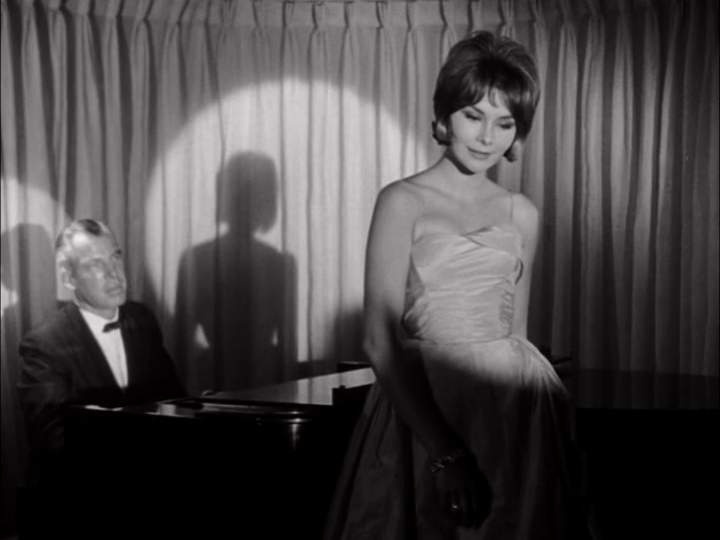
1 Peckinpah: "I wanted to direct Emperor so badly that I even agreed to do it for an enormous cut in salary. Ken liked it and took it around to UA and Metro before he finally set up a meeting with Bob Evans at Paramount. I went to that meeting with my agent. Evans said, 'I can guarantee you on my personal word that if you do Getaway as your next picture, we will follow it with Emperor of the North Pole.' I said, 'You better go talk to Ken about this.' So he went and talked to Ken and said that he would take care of everything. So I agreed to do Getaway. The next thing I knew, I received this fucking letter from Hyman dismissing me as director of Emperor. All I got out of Emperor was a $10,000 settlement from Ken Hyman, which I really hated because it was my property to begin with. I had put in three years on that picture trying to get it made."
2 While this is not the first American television appearance of former model Macha Meril (she had appeared on an episode of Naked City earlier that year), it was to be her last, as she'd immediately return to France for a small role in Rohmer's first feature Le signe du lion, followed by her most prominent appearance as the eponymous lead in Godard's Une Femme Mariée. She went on to play Renee in Belle de Jour, the murdered psychic in Deep Red, Traunitz in Chinese Roulette and Mme Landier in Vagabond, so along with noted New Wavers Rohmer, Godard and Varda she worked with Peckinpah, Buñuel, Argento and Fassbinder - not bad! In this episode she performs two songs, "Sous le Ciel de Paris" and "Que Reste-t-il de nos Amours?", for which Meril was dubbed by Hilda Brawner.
3 That same year, Marvin became an original sponsor of the Stuntmen's Association of Motion Pictures. Eventually he was made an Honorary Member. In 1967, stuntmen Ted White and Jerry Catron were so impressed with Marvin on the set of Point Blank they presented him with a stuntman's check after production wrapped.
4 According to Dwayne Epstein's Lee Marvin: Point Blank, Marvin visited Wynn on his deathbed (less than a year before his own demise) and the two shared a tender moment of mutual love and friendship.









